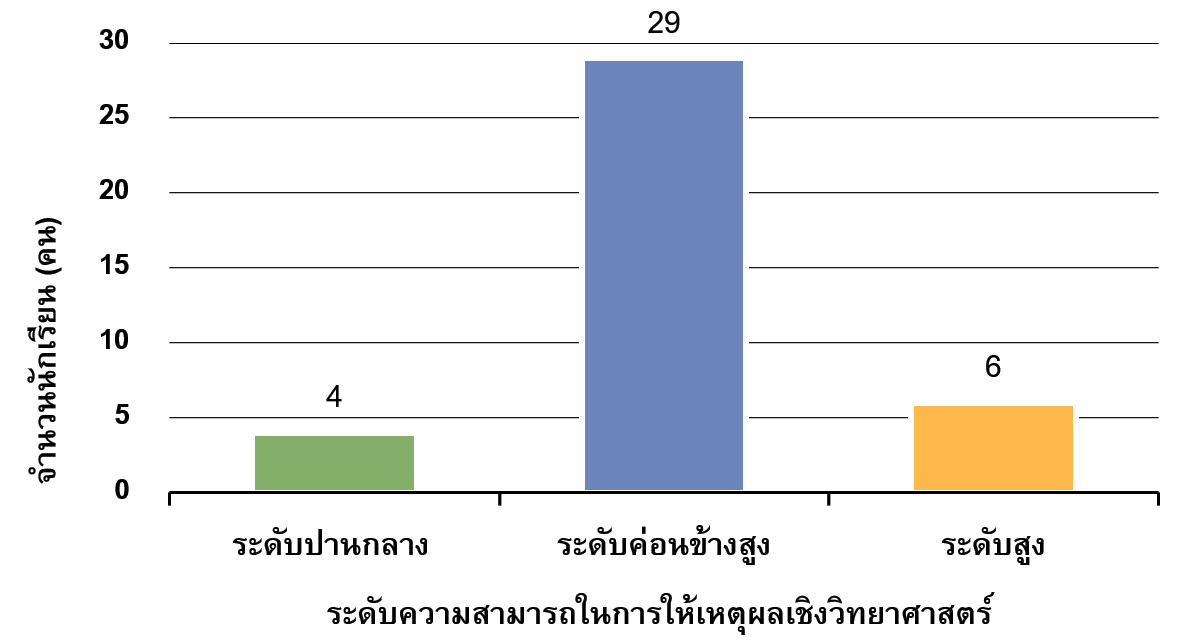ผลการจัดการเรียนรู้ที่เน้นแบบจำลองเรื่องเคมีไฟฟ้าที่มีต่อความสามารถในการให้เหตุผลเชิงวิทยาศาสตร์ของนักเรียนมัธยมศึกษาตอนปลาย
Main Article Content
Abstract
Thitirat Deesamer and Parinda Limpanont Promratana
รับบทความ: 26 เมษายน 2567; แก้ไขบทความ: 23 กรกฎาคม 2567; ยอมรับตีพิมพ์: 28 กรกฎาคม 2567; ตีพิมพ์ออนไลน์: 25 ธันวาคม 2567
บทคัดย่อ
ความสามารถในการให้เหตุผลเชิงวิทยาศาสตร์มีความสำคัญต่อการเรียนรู้ของนักเรียนในกระบวนการแก้ปัญหาและการอภิปรายทางวิทยาศาสตร์ รวมทั้งเป็นส่วนหนึ่งในเป้าหมายของการศึกษาวิทยาศาสตร์ปัจจุบัน ซึ่งการวิจัยนี้มีวัตถุประสงค์เพื่อ 1) เปรียบเทียบคะแนนความสามารถในการให้เหตุผลเชิงวิทยาศาสตร์ของนักเรียนหลังได้รับการจัดการเรียนรู้ที่เน้นแบบจำลองเทียบกับเกณฑ์ และ 2) ศึกษาการเปลี่ยนแปลงความสามารถในการให้เหตุผลเชิงวิทยาศาสตร์ระหว่างจัดการเรียนรู้ กลุ่มเป้าหมายคือ นักเรียนระดับชั้นมัธยมศึกษาปีที่ 5 จำนวน 39 คน เครื่องมือที่ใช้ในการวิจัย ได้แก่ แผนการจัดการเรียนรู้ที่เน้นแบบจำลองและแบบวัดความสามารถในการให้เหตุผลเชิงวิทยาศาสตร์ นอกจากนี้ยังวิเคราะห์การเปลี่ยนแปลงการให้เหตุผลเชิงวิทยาศาสตร์ระหว่างจัดการเรียนรู้จากแบบบันทึกกิจกรรม ผลการวิจัยพบว่าหลังได้รับการจัดการเรียนรู้ที่เน้นแบบจำลองเรื่องเคมีไฟฟ้า นักเรียนส่วนใหญ่มีความสามารถในการให้เหตุผลเชิงวิทยาศาสตร์อยู่ในระดับค่อนข้างสูง มีคะแนนเฉลี่ยเท่ากับ 44.74 คะแนน (ร้อยละ 71.02) แต่ไม่สูงกว่าเกณฑ์ที่กำหนดไว้ร้อยละ 69 อย่างมีนัย-สำคัญทางสถิติที่ระดับ .05 โดยองค์ประกอบที่มีคะแนนเฉลี่ยสูงที่สุด ได้แก่ การสร้างสมมติฐาน และการประเมินหลักฐาน ตามลำดับ และระหว่างจัดการเรียนรู้ที่เน้นแบบจำลองเรื่องเคมีไฟฟ้า นักเรียนกลุ่มที่มีคะแนนสูง กลุ่มคะแนนค่อนข้างสูง และกลุ่มคะแนนปานกลาง พบการเปลี่ยนแปลงการให้เหตุผลเชิงวิทยาศาสตร์ในแต่ละองค์ประกอบมีพัฒนาการดีขึ้นในการจัดการเรียนรู้ครั้งที่ 2 4 และ 5 ตามลำดับ
คำสำคัญ: การให้เหตุผลเชิงวิทยาศาสตร์ การจัดการเรียนรู้ที่เน้นแบบจำลอง เคมีไฟฟ้า
Abstract
Scientific reasoning ability is crucial for students’ learning in problem–solving and scientific discussion. It is also a part of the current science education goals. The purposes of this study were to 1) compare the scores of students’ scientific reasoning abilities after learning through model–centered instructional sequence (MIS) compared to the criteria, and 2) investigate changes in scientific reasoning abilities during learning through MIS. The target group was 39 Grade–11 students at a senior secondary school. The research tools were the MIS lesson plans and a scientific reasoning ability test. In addition, activity sheets were used to analyze changes in scientific reasoning during learning activities. The results showed that after learning through MIS in electrochemistry, most students had a relatively high level of scientific reasoning ability. The average score was 44.74 points (71.02%). However, the average score was not statistically higher than the criterion score set at 69%. The components with the highest average scores were hypothesis generation and evidence evaluation, respectively. Students in the high, relatively high, and moderate score groups had shown progressive improvements in their scientific reasoning abilities during the second, fourth, and fifth sessions of the MIS in electrochemistry, respectively.
Keywords: Scientific reasoning, Model–centered instructional sequence (MIS), Electrochemistry
Downloads
Article Details

This work is licensed under a Creative Commons Attribution-NonCommercial 4.0 International License.
References
Abate, T., Michael, K., and Angell, C. (2020). Assessment of scientific reasoning: Development and validation of scientific reasoning assessment tool. Eurasia Journal of Mathematics, Science and Technology Education 16(12): 1–15.
Baek, H., Schwarz, C., Chen, J., Hokayem, H., and Zhan, L. (2011). Engaging elementary students in scientific modeling: The MoDeLS fifth–grade approach and findings. In Khine, M. S., and Saleh, I. M. (Eds.), Models and modeling (pp.195–218). Dordrecht: Springer.
Brown, N. J., Furtak, E. M., Timms, M., Nagashima, S. O., and Wilson, M. (2010). The evidence–based reasoning framework: Assessing scientific reasoning. Educational Assessment 15(3–4): 123–141.
Chaimongkol, P., Chanunan, S., and Klamtet, J. (2016). Development of scientific reasoning ability in stoichiometry unit using argument–driven inquiry instructional model. Journal of Research Unit on Science, Technology and Environment for Learning 8(1): 27–40. (in Thai)
Fischer, F., Kollar, I., Ufer, S., Sodian, B., Hussmann, H., Pekrun, R., Neuhaus, B., Dorner, B., Pankofer, S., and Fischer, M. (2014). Scientific reasoning and argumentation: Advancing an interdisciplinary research agenda in education. Frontline Learning Research 2(3): 28–45.
Han, J. (2013). Scientific Reasoning: Research, Development, and Assessment. Doctor of Philosophy Dissertation. Ohio: The Ohio State University.
Kitcharoenpanya, J. (2020). Development of Scientific Modeling Ability and Attitude towards Teamwork of Lower Secondary School Students through the Predict Share Observe Explain Instructional Model. Master of Education Thesis (Science Education). Bangkok: Chulalongkorn University. (in Thai)
Lawson, A. E. (2004). The nature and development of scientific reasoning: A synthetic view. International Journal of Science and Mathematics Education 2(3): 307–338.
Opitz, A., Heene, M., and Fischer, F. (2017). Measuring scientific reasoning – A review of test instruments. Educational Research and Evaluation 23(3–4): 78–101.
Osborne, J. (2013). The 21st century challenge for science education: Assessing scientific reasoning. Thinking Skills and Creativity 10: 265–279.
Piraksa, C., Srisawasdi, N., and Koul, R. (2014). Effect of gender on student’s scientific reasoning ability: A case study in Thailand. Procedia – Social and Behavioral Sciences 116: 486–491.
PISA THAILAND. Retrieved from https://pisa thailand.ipst.ac.th/about-pisa/science_competency_framewark/, April 24, 2024.
Schwarz, C. V., Reiser, B. J., Davis, E. A., Kenyon, L., Achér, A., Fortus, D., Shwartz, Y., Hug, B., and Krajcik, J. (2009). Developing a learning progression for scientific modeling: Making scientific modeling accessible and meaningful for learners. Journal of Research in Science Teaching: The Official Journal of the National Association for Research in Science Teaching 46(6): 632–654.
Soncha, N., Ketsing, J., and Kongsema, M. (2017). Grade 10th students’ scientific reasoning in biology. The 56th Kasetsart University Annual Conference (pp. 116– 125). Bangkok: Kasetsart University.
Suaklun, P. (2019). Effects of Learning Using Historical Approach on Scientific Reasoning Abilities and Chemistry Learning Achievement of Upper Secondary School Students. Master of Education Thesis (Science Education). Bangkok: Chulalongkorn University. (in Thai)
Suchairut, N. (2015). Development of an Instructional Model based on Model–based Inquiry and Context–based Learning Approaches to promote Scientific Reasoning and Transfer of Learning Abilities of Lower Secondary Students. Doctor of Education Dissertation. Bangkok: Chulalongkorn University. (in Thai)
Windschitl, M., Thompson, J., and Braaten, M. (2008). Beyond the scientific method: Model–based inquiry as a new paradigm of preference for school science investigations. Science Education 92(5): 941– 967.
Zeineddin, A., and Abd–El–Khalick, F. (2010). Scientific reasoning and epistemological commitments: Coordination of theory and evidence among college science students. Journal of Research in Science Teaching 47(9): 1064–1093.
Zimmerman, C. (2005). The development of scientific reasoning skills: What psychologists contribute to an understanding of elementary science learning. Final draft of a Report to the National Research Council Committee on Science Learning Kindergarten through Eighth Grade (pp. 1–109). USA: Illinois State University.
